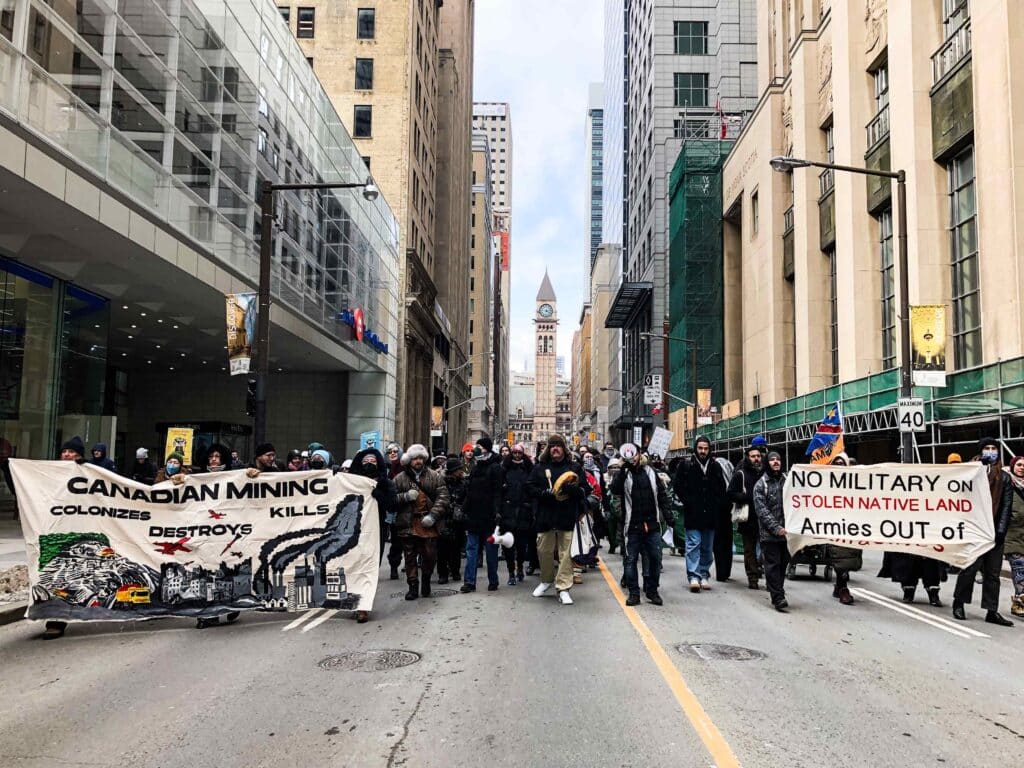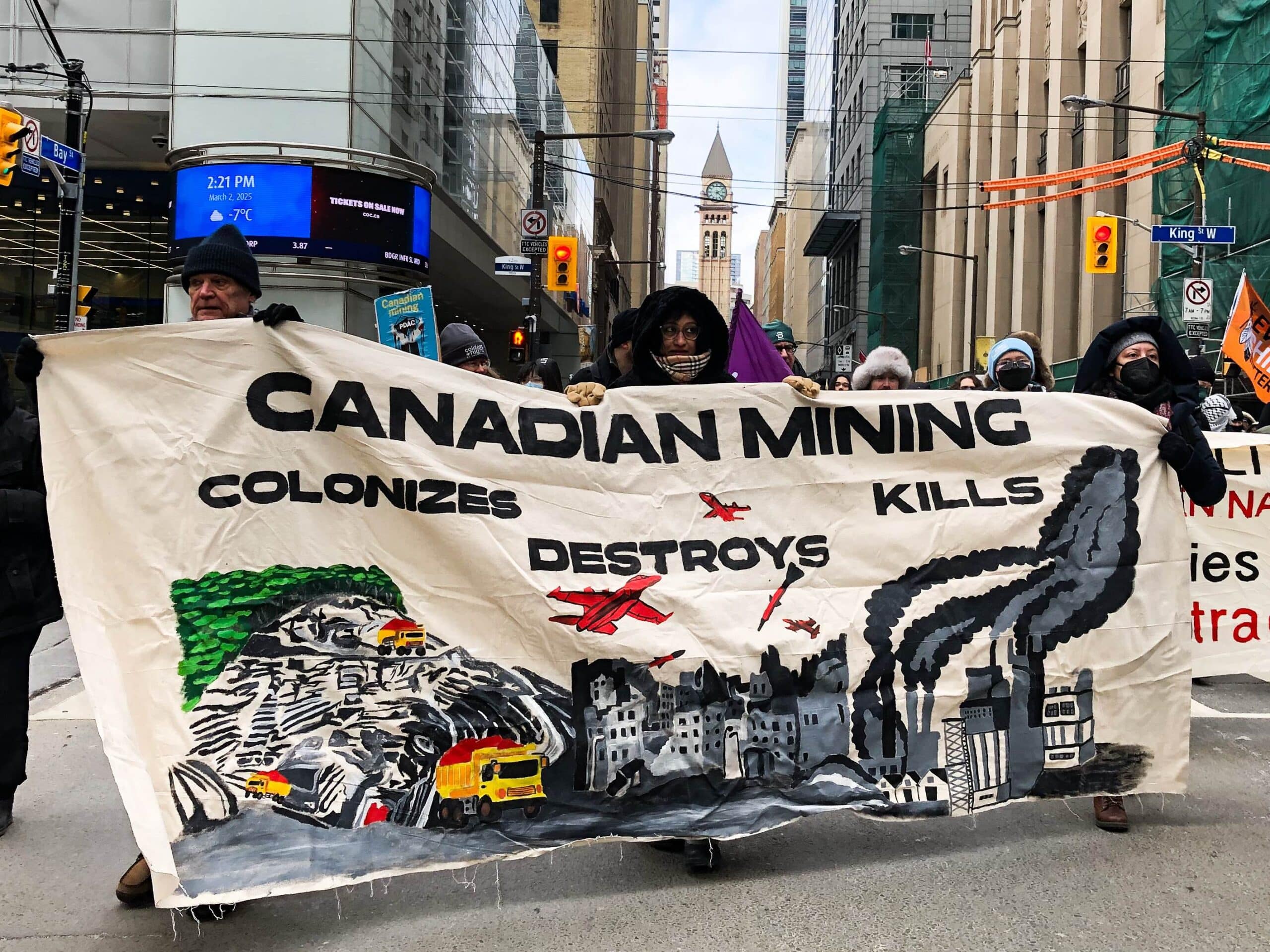On Sunday 2 March 2025, CPT joined hundreds of people in Toronto to protest the annual Prospectors and Developers Association of Canada (PDAC) Convention. Many Canadians are unaware of this huge event and of Canada’s dominant role in the global mining sector: 75% of the world’s mining companies are headquartered in Canada, largely because of lax regulations governing overseas mining operations. Every year PDAC boasts about bringing over 27,000 attendees from 135 countries to attend their convention. They claim, “[PDAC] is the leading voice of the mineral exploration and development community, an industry that employs more than 665,000 individuals, and contributed $125 billion to Canada’s GDP in 2021.” While the convention promotes itself as a celebration of industry and diversity, in actuality it represents the mining industry’s human rights violations, Indigenous land theft, environmental destruction, and militarisation. The protest was organised by the Mining Injustice Solidarity Network (MISN), an organisation allied with CPT, which seeks to hold Canadian mining companies accountable for their actions worldwide.
Each of CPT’s teams has seen our partners impacted by resource extraction and the mining industry. Many of CPT’s Turtle Island partners are Indigenous land defenders and water protectors resisting resource extraction projects including mining. CPT’s longtime partners in Grassy Narrows First Nation recently formed a Land Defense Alliance with other First Nations in northern Ontario demanding a moratorium on mining exploration claims on their territories. Over the last few years, Indigenous communities have seen an exponential rise in claims as prospectors scramble for critical minerals used in technologies such as electric cars, computers and cell phones. Prospectors can file claims online without ever visiting the land in question or consulting with the Indigenous communities that live there. Time and time again on Turtle Island we have seen that when Indigenous communities resist resource extraction on their territory, the government sends in a militarised police force to enforce it. For example, on several occasions the Royal Canadian Mounted Police (RCMP) have raided Wet’suwet’en Territory in attempts to stop Wet’suwet’en People from resisting the Coastal GasLink (CGL) pipeline from being built on their land.
At the US-Mexico border, CPT accompanies migrants who have been displaced from their homelands by various social and economic crises. The mining industry is one of these. Canadian mining companies in Latin America have expelled Indigenous people from their lands, made their lands uninhabitable, and contributed to the regional insecurity that has led people to flee their homes. In 2022, Ricochet Media reported the direct displacement of a community by Pan American Silver:
“Somewhere between 2014 to 2017, the company allegedly forced the local community out of their homes and off their land. Multiple news outlets have reported stories about villagers from the community of La Colorada, in the central northern Mexican state of Zacatecas, being violently uprooted by armed security forces hired by Pan American Silver.”
In recent years, CPT members have participated in campaigns drawing attention to the deadly violence connected to mining projects by Canadian companies. Hundreds of community leaders in Central and South America, Asia and Africa have been assassinated as reprisal for their public resistance to mining projects, as documented by organisations such as MISN and Mining Watch Canada. In 2011, CPT Colombia wrote an article highlighting how mining companies were feeding the violence on the ground by funding both paramilitary and rebel guerrilla groups in different areas. CPT reported that in September 2011 unknown assailants assassinated Father Jose Reinel Restrepo Indairrage. Father Restrepo strongly opposed Canadian-owned Medoro Resources’ open pit mining project. This is just one example of how mining companies benefit from the existence of armed groups. Canadian gold mines continue to wreak havoc in Colombia: in 2022, The Breach published an article describing how Canadian mining company Gran Colombia not only has ties to rightwing paramilitaries, but has also been involved in laundering illegally mined gold into legal markets.
Mining and the military-industrial complex are two heads of the same beast, feeding and strengthening each other. One cannot exist without the other. In Palestine, Israel’s F-35s continue to bombard Gaza and the northern West Bank. At the demonstration against PDAC, Rachel Small from World Beyond War shared that each F-35 contains “over 900 lbs. [400 kg.] of rare earth elements. Several rare earth element companies are in attendance at the PDAC convention this year, as are some of the world’s largest producers of aluminum, platinum and cobalt – all of which are required to build modern weapons for war.” Genocide in Palestine, Turkiye’s bombing of Iraqi Kurdistan, and resource conflicts in central Africa all contribute to regional insecurity driving migration from West Asia and Africa to Europe, as seen in Lesvos, Greece, where CPT accompanies migrants who, attempting to arrive by dinghy, are intercepted by the Greek Coast Guard with the knowledge, sometimes the active assistance, of the European Union’s border agency FRONTEX. Many are then persecuted in the courts by legislation designed to tackle “people smugglers”, which is misinterpreted by the Greek judicial system to punish migrants themselves.

The PDAC convention is the “belly of beast” for Indigenous displacement, ecocide, and genocide. The companies that find a home at PDAC have contributed to violence and destruction in every one of the contexts in which CPT works. On Sunday 2 March hundreds of people marched through the streets of Toronto to condemn PDAC’s global impacts. As we reached the doors of the convention center, which police quickly blocked, delegates inside looked aghast. While some looked confused, others filmed, and some laughed.
Despite the strength of our enemies, we remain strong in the streets. While we may not have stopped the PDAC Convention, our attendance and our protest are essential in challenging its glossy narrative. Rachel Small answered the question of why we show up every year,
“Because ‘business as usual’ is a direct path to a planet that is literally unlivable. A world with even greater levels of wealth inequality. A world in which the mining companies that inflict mass displacement are also the ones lobbying for harsher border and migration policies. A world defined by imperialism and neo-colonialism. A world where capital takes precedence over human rights. This is not the world we deserve. And it is not the world we are trying to build.”




